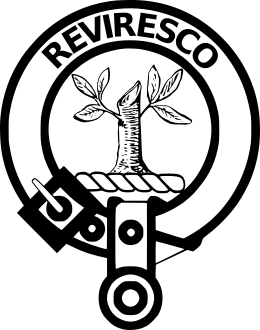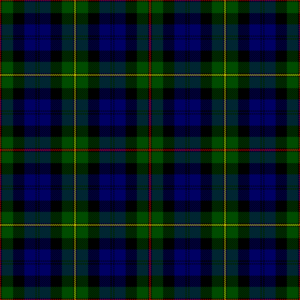Clan MacEwen facts for kids
Quick facts for kids Clan MacEwen |
|
|---|---|
| MacEòghainn (Son of Ewen) | |
 |
|
| Motto | Reviresco (I grow strong again) |
| Profile | |
| District | Cowal, Galloway, Lennox and Perthshire |
| Clan MacEwen has no chief, and is an armigerous clan | |
| Last Chief | Swene MacEwen |
| Died | 1493 |
Clan MacEwen or Clan MacEwan is a Scottish clan. A clan is like a large family group, often with a shared history and a chief. This clan was first written about in the 1400s as Clan Ewen of Otter.
Over time, there have been several different MacEwen clans and family groups, called septs. These groups sometimes had different beginnings, but they all used the MacEwen name. Since 1493, Clan MacEwen has not had a recognized chief. This means it is an Armigerous clan. An armigerous clan is a clan that does not have a chief recognized by the official Scottish authority, the Lord Lyon King of Arms.
As of 2020, members of the Clan MacEwen Society in the UK have chosen a leader. His name is Sir John Roderick Hugh McEwen, 5th Baronet. He might become the first chief recognized by the Lord Lyon since Swene MacEwen died in 1493. The title of McEwen Baronet was created in 1953 by Queen Elizabeth II. These modern McEwens may not have a direct historical link to the old Clan MacEwen of Otter.
There are also other clan groups for people with names like Ewen, Ewing, and MacEwan.
Contents
Who Were the Historical MacEwen Clans?
The name "MacEwen" comes from the Scottish Gaelic name, MacEòghainn. This means "son of Eòghann". The name could have started in different places and at different times. Many different spellings of MacEòghainn have been recorded. Several clans and septs likely got their name from men named Eòghann. These groups can be found in Scotland and Ireland.
Clan Ewen of Otter
The MacEwen lords of Otter are mentioned in records from the 1300s and 1400s. The family history of this clan is written in an old document called MS 1467. This document is now kept at the National Library of Scotland. The last MacEwen of Otter was Swene MacEwen. When he died in 1493, his lands became part of the Clan Campbell's control.
MacEwens in Galloway
MacEwens have lived in Galloway, Scotland, since 1331. This was even before the first MacEwens of Otter were recorded. One early MacEwen, Patrick McEwyn, was a leader in Wigtown. People say these McEwens fought with the Clan Agnew against the Black Douglas family. This fight was about who controlled the area in the 1400s.
MacEwens of MacDougall
Many MacEwens believe they are related to Clan MacDougall. The MacDougall chiefs have also recognized a MacEwen sept. A sept is a family group that is part of a larger clan. For example, MacEwan of Muckley was a descendant of Ewen Mor MacDougall. He was the brother of the MacDougall of Lorne. So, MacEwens in the Perthshire and Loch Tay areas were seen as part of Clan MacDougall.
MacEwens of Clan Cameron
In the 1500s, a group of Camerons were also known as 'Clan Ewyne'. Their leader was Donald Mac Ewen Vic Ewen Cameron. He was killed in 1570. His followers then took the MacEwen name. In Gaelic, this group was called Sliochd Eoghain 'ic Eoghain. Some MacEwens who took part in the Moyness Raid in 1598 were from this clan.
MacEwan Bardic Family
The MacEwan bardic family was a famous group of poets. They wrote classical Gaelic poetry. They were known as one of the "families of the filidh," which means skilled poets. This family worked for the MacDougalls of Lorne. Later, they worked for the Campbells of Argyll. These MacEwan poets were likely from Ireland. They might have been a branch of the Irish O'Hosey family. A part of this family may have also been harpers in the mid-1500s.
Interesting Historical Notes
It is often said that a law from 1602 listed MacEwens. It said they were connected to the MacLachlans and McNeils. It also said they were under the Earl of Argyll and had to answer to him.
The Clan MacLachlan has a tradition. They say that after Swene MacEwen died, they offered to protect their MacEwen cousins. This is because the two clans have always been allies and relatives. Because of this, Clan MacLachlan often welcomes MacEwens to join their clan.
In 1715, a list of Highland forces was made. This list was for the Jacobite rising of 1715. According to a historian named James Logan, the MacEwens from the Isle of Skye gathered 150 men for this event.
Modern Clan Symbols
Crest Badge
Many clan members today wear a crest badge. This shows they belong to a certain clan. A crest badge usually has a clan chief's heraldic crest inside a strap and buckle. The chief's motto is written on the strap. Since the 1800s, many MacEwens have used a crest with a large oak stump. This stump looks like it was once a big oak tree. Even though it was cut down, new branches are growing from it. The Latin motto REVIRESCO means "I grow strong again."
This crest and motto are also on the Arms of the McEwen Baronets. These McEwens owned land in Bardrochat in Carrick. However, these McEwen Baronets might not be historically linked to the old Clan MacEwen of Otter.
Tartan
The MacEwen tartan looks very similar to the tartans of the Farquharson and MacLeod of Harris clans. The pattern is also like the Campbell of Loudon tartan. The only difference is that the MacEwen tartan has a red stripe instead of a white one. The MacEwen tartan also looks a lot like the Clan Colquhoun tartan. But the Colquhoun tartan has all red stripes instead of the yellow MacEwen stripe. Also, the Colquhoun plaid has white border stripes around the blue and green squares.
Efforts to Appoint a New Chief
On February 27, 2012, the Lord Lyon announced a plan. He wanted to appoint an officer to help the MacEwen family choose a new leader. This leader would be called a "Commander." On October 11, 2012, the Lord Lyon named the Honourable Adam Bruce as this officer.
As of 2020, members of the Clan MacEwen Society in the UK have chosen a Commander. He is Sir John R.H McEwen, 5th Baronet. He is now in line to become the first chief since Swene MacEwen died in 1493. Sir John inherited his Baronet title from his grandfather, Sir John McEwen, 1st Baronet. His grandfather's title was created by the Queen of the United Kingdom in 1953. These modern McEwen Baronets may not have a historical connection to the old Clan MacEwen of Otter. The Clan Ewing has decided to form their own separate group.
See also
 | John T. Biggers |
 | Thomas Blackshear |
 | Mark Bradford |
 | Beverly Buchanan |


